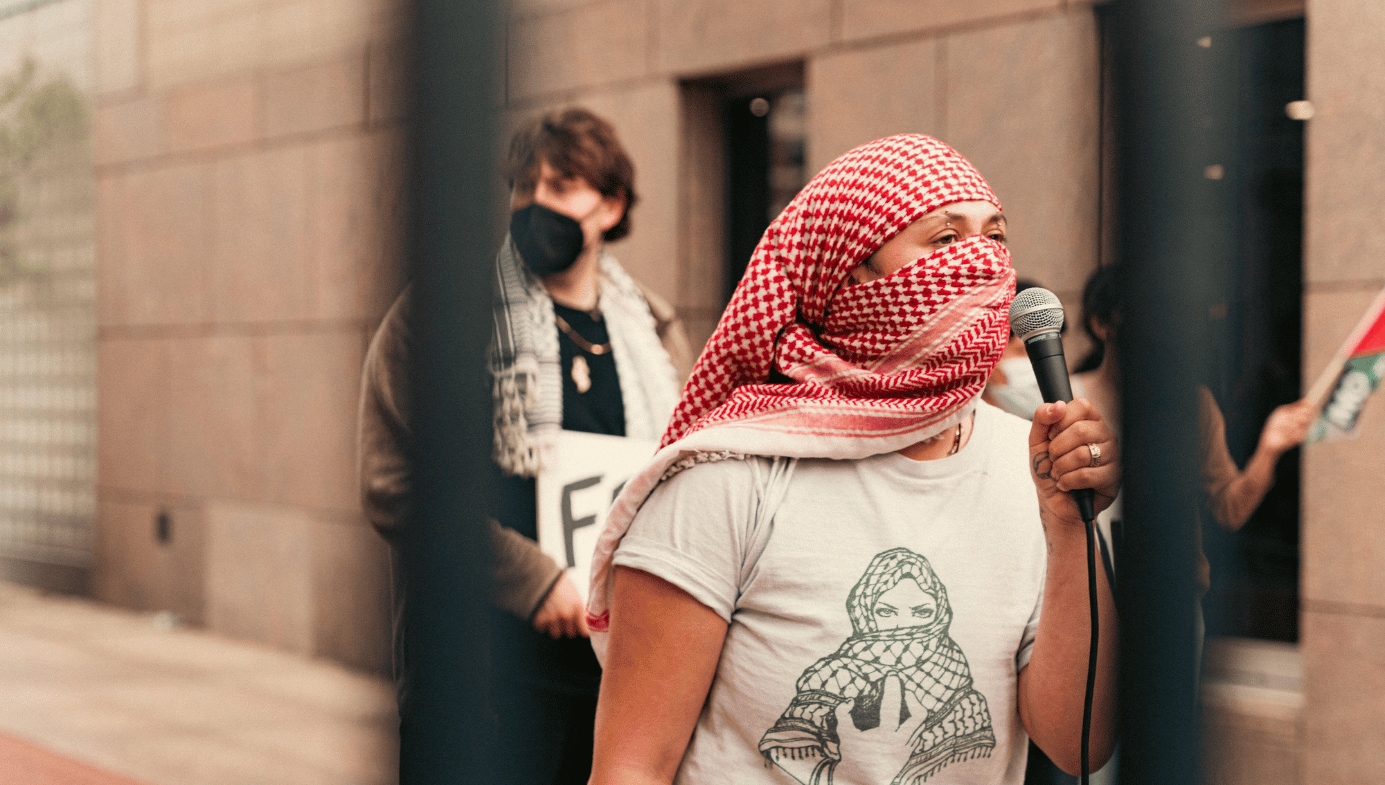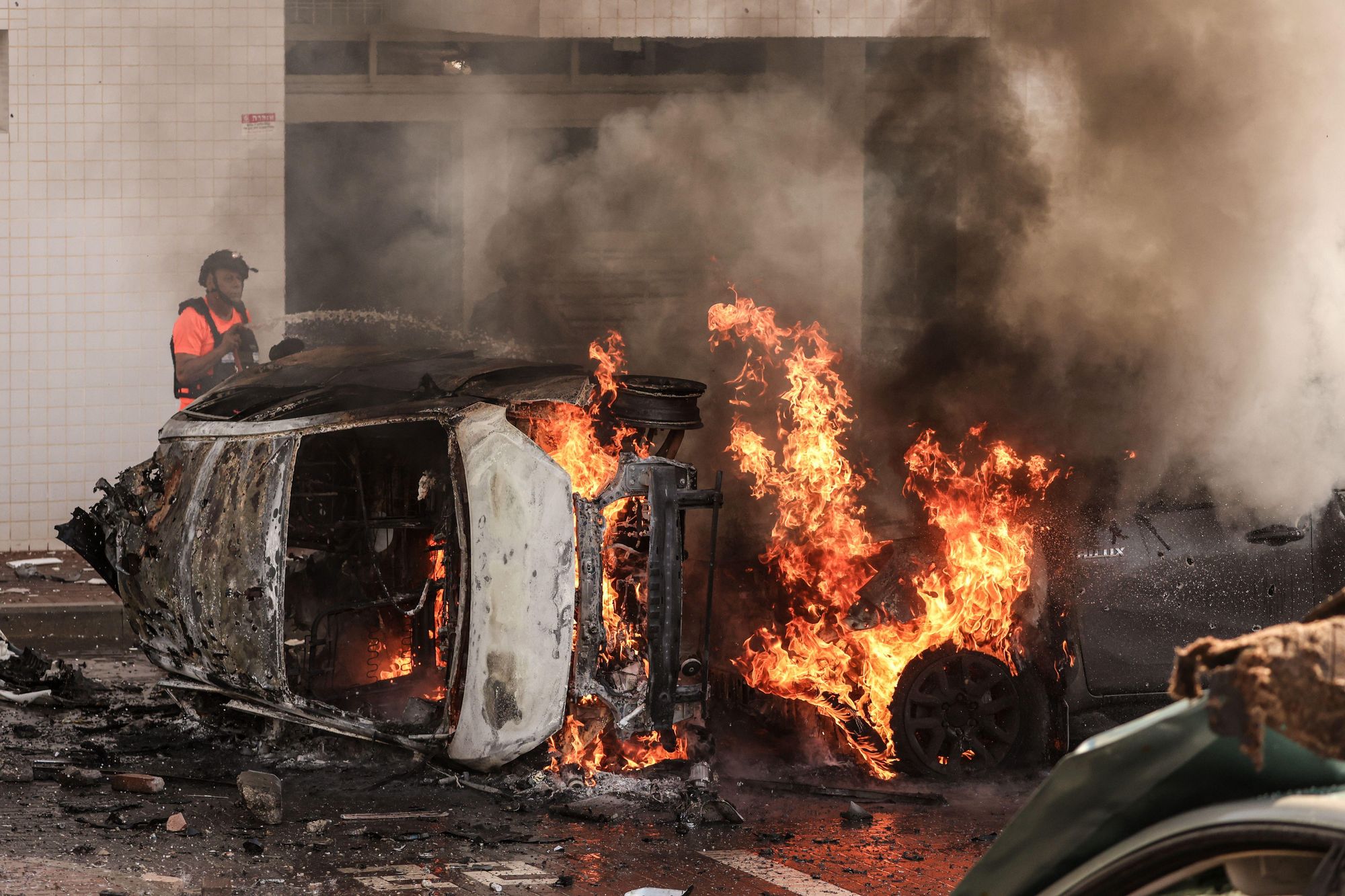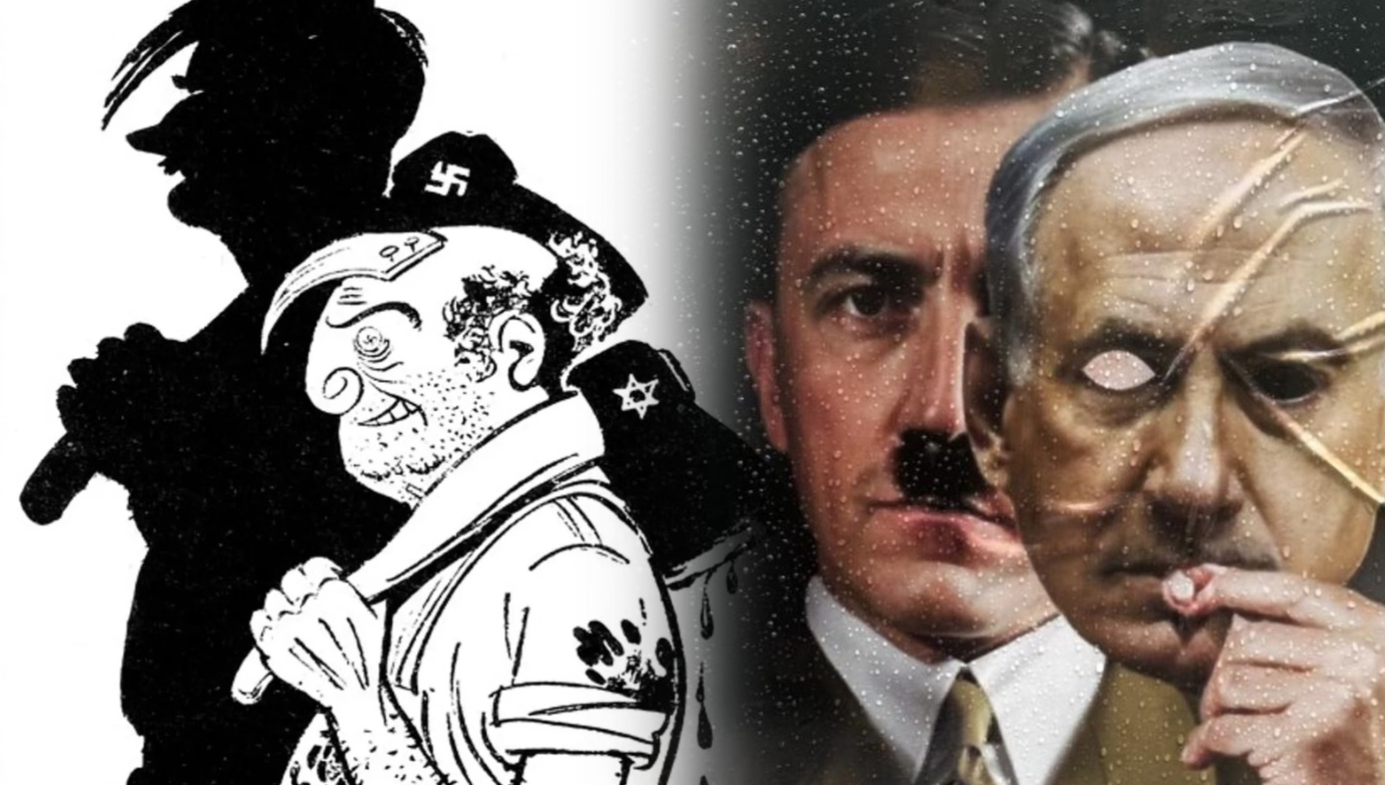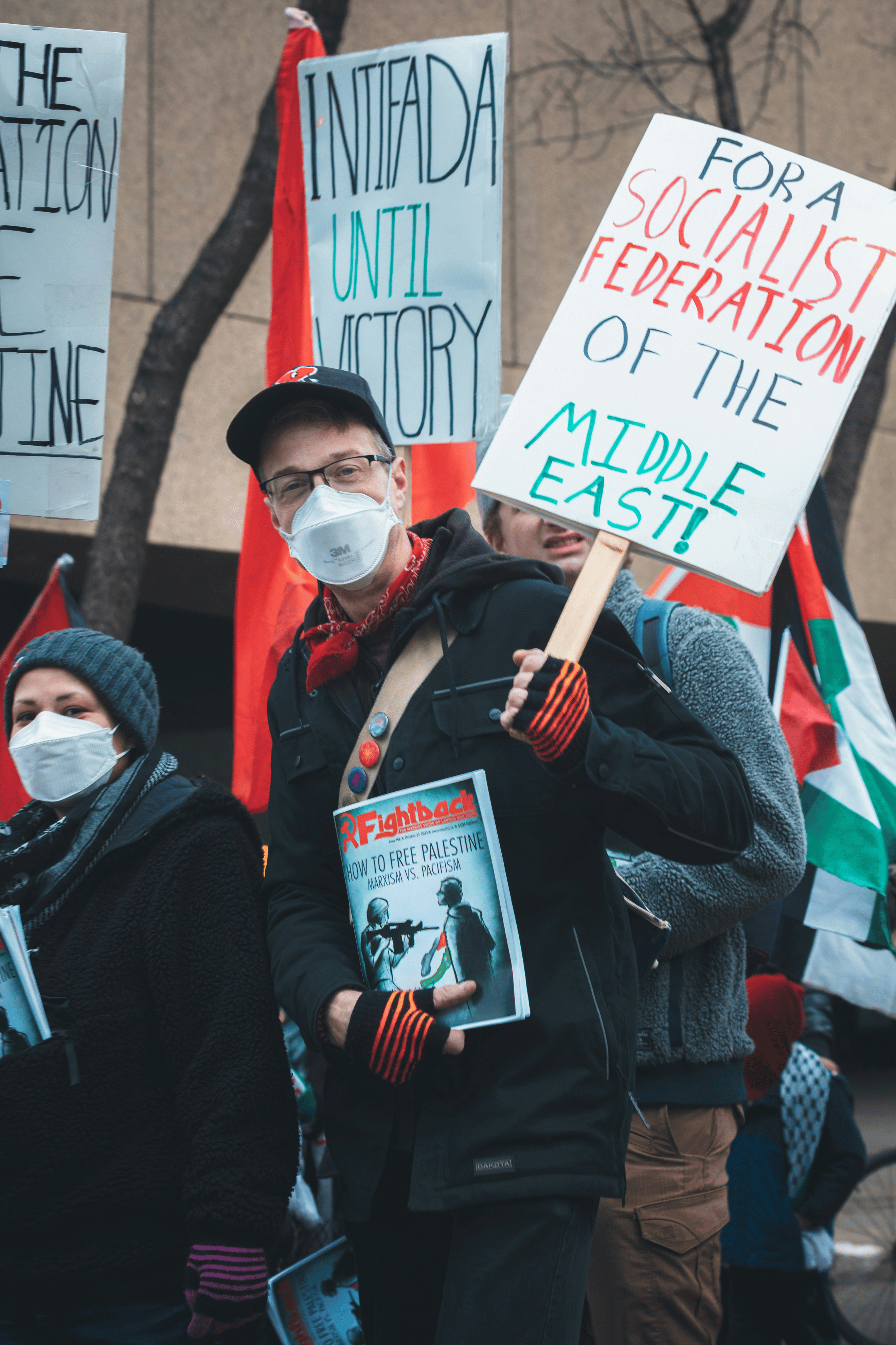
I. Pre-Modern Hatred in Modern Drag
On the evening of 29 April 2024, demonstrators occupied Columbia’s Hamilton Hall, barricaded themselves inside, and refused to move until Columbia agreed to divest its endowment funds from Israel. A video published by the Free Press shows a masked person using a hammer to smash the glass in the building’s doors, before using what appears to be a bike lock to secure them. Other masked protesters build a makeshift barricade out of chairs. That evening, protesters outside the occupied building cheered its “liberation” and denounced Israeli “apartheid” and “genocide.” One young woman can be seen in a sweatshirt from Choate Rosemary Hall—one of the most expensive and exclusive private boarding schools in the United States. It is a feeder school to the Ivy League, and the alma mater of President John F. Kennedy (among other members of the American establishment).
In unaccented American English, the supporting crowd chants that “Israel will fall! Brick by brick, wall by wall! We want all of it! Settlers, settlers go back home! Palestine is ours alone!” These young Americans at Columbia university and at other demonstrations this spring are openly—and proudly—calling for the destruction of the state of Israel. Though they have no claim to use the word “ours alone” regarding any territory in the Middle East, in the name of anti-racism and anti-imperialism, they support the “martyrs” of Hamas who aim to create an ethnically and religiously cleansed “Palestine” free of Jews.
These disgraceful scenes are one result of the emergence, over the last decade or so, of a pro-Hamas Left among the faculty and students in America’s universities. Since the 7 October massacre of over twelve hundred Israelis was orchestrated by Hamas’s military leader in Gaza, Yahya Sinwar, this contingent has burst into full and unapologetic public view. While many in the professoriate would strenuously deny that they are supporters of Hamas, their stubborn refusal to call for the organisation’s surrender and their vehement denunciations of Israel’s military response both lend objective moral support to the terrorist group during the ongoing conflict.
In one way, this development is not surprising—antagonism to Israel has long been a defining element of leftist ideology, and there is nothing new to be heard in the protesters’ chants and slogans. The calumny that Israel is a racist and genocidal colonial state has been a part of the assault on Israel in world politics since the late 1960s. For most of that time, American and European decolonial leftists—including professors, students, activists, and journalists—supported what they regarded as an equally leftist and decolonial project represented by the Palestine Liberation Organisation. Accordingly, they made excuses for the PLO’s terrorism and insisted that its effort to destroy the state of Israel by force of arms was not motivated by antisemitism. Yassir Arafat entered the romantic pantheon of global Third World revolutionaries and became a regular visitor to Moscow and East Berlin. These decades of secular antagonism to Israel created the foundation for the Left’s willingness to defend Hamas in spite of its reactionary religious fanaticism.
But in another way, the academic Left’s enthusiasm for Hamas is remarkable. The enthusiasm of leftist professors and students for the Islamic Resistance Movement in Gaza is unprecedented in the history of modern leftism. Scepticism and even outright rejection of what Marx called “the opiate of the people” has been a salient theme of leftist sensibilities since the French Revolution. Yet Hamas’s punishing fundamentalism has not deterred the secular American Left from embracing what I have called “fascism with a religious face.” Over the past decade, I have drawn attention to the emergence of the pro-Hamas Left, and to the bizarre fact that secular intellectuals and students are now supporting an organisation that grew out of the Muslim Brotherhood and Nazi collaborators. Today, the Islamisation of the Left has become unignorable on college campuses.

As its foundational Covenant made clear in 1988, Hamas’s reactionary nature lies in a selective reading of Islam’s ancient texts that defines the religion as inherently antisemitic. This interpretation of Islam legitimises Hamas’s religious war to destroy the state of Israel, its rejection of liberal democracy, its use of terror as a political weapon, and its social conservatism that demands the subordination of women and lethal hostility to homosexuality. All of which ought to make Hamas anathema to social progressives on the academic Left. But the enthusiasm with which secular anti-Zionists have rallied to the cause of Hamas’s religious warriors—or at least protected them from criticism—suggests that solidarity in their shared hatred of a common enemy, Israel, supersedes all other political differences.
Over the last half-century, Israel’s secular antagonists have indignantly rejected the possibility that waging war to destroy the world’s only Jewish state and the Middle East’s only liberal democracy has anything to do with antisemitism. They insist that it is “only Zionism” they oppose, as if that position has nothing to do with antisemitism and its double standards. The attack on the right of Israel to exist may have been the first moment in the long history of antisemitism when those attacking the Jews protested that they were not antisemites at all. By adopting the language of modern progressive politics—human rights, revolutionary anti-colonialism, and anti-racism—the PLO and its supporters sought to deny that their campaign of terror against Israel was simply the latest iteration of a paranoid hatred with ancient, pre-modern roots. They insisted they had no quarrel with Judaism or the Jewish people, and that the accusation of antisemitism was simply an effort to malign the legitimate criticism of Israeli policies.
Since the 1960s—first in world politics at the United Nations and then in American universities—secular anti-Zionists have placed the blame for the absence of peace in the Middle East exclusively on Israel. During the 1970s and ’80s, Soviet propagandists compared Israel to Nazi Germany and members of radical West German terrorist organisations like the Red Army Faction redescribed Zionism as fascism. When Palestinian leaders rejected Israeli offers of a two-state solution in the late 1990s and early 2000s, the West’s anti-Zionist intellectuals all agreed that the offers were beneath consideration. When the PLO and its various affiliates responded to these offers by murdering and maiming Israeli civilians in terrorist campaigns, supporters in Europe and the United States simply redefined terrorism as justifiable resistance to Israeli injustice. And when Israel retaliated against those terrorist attacks, Western anti-Zionists denounced that retaliation as unjustified aggression.

The anti-Zionist Left in British and American universities contended that the Zionist project and the state of Israel were ethno-religious anachronisms in a modern multicultural world—relics of a racial nationalism that prevailed in a less enlightened era. For the leftist academy, the Arab leaders of the PLO were Leninist comrades comparable to Che and Castro and Mao, not Muslim Brotherhood fanatics or followers of Islamic Jew-haters like Haj Amin el-Husseini and Sayyid Qutb. The embrace of Yassir Arafat by East Berlin and Moscow—not to mention the flood of PLO-sympathetic UN resolutions denouncing Israel—conveyed that the PLO and its global supporters were part of a secular modern revolutionary movement.
Four decades of undeclared war against Israel by communists and their Western apologists helped to sustain antisemitism after it appeared to have been decisively discredited by the Nazis and their Holocaust. The communists placed the prestige of anti-fascism in the service of an antisemitic project—the destruction of the Jewish state—and thereby gave new life and respectability to the world’s oldest hatred. Israel, the communists decided, was the “spearhead” of American imperialism in the Middle East, a development that could only be explained by the sinister and disproportionate influence on US foreign policy exerted by American Jews.

The Hamas Charter of 1988 represented a sharp turn away from these efforts to distinguish antisemitism from anti-Zionism. The revised Statement of 2017 adopts the language of secular, leftist anti-Zionism but reaffirms Hamas’s determination to eliminate the Jewish state “from the river to the sea.” As justification for its genocidal campaign against world Jewry, Hamas’s foundational Charter invoked the fabricated Protocols of the Elders of Zion along with Nazi propaganda that blamed the Jews for the French Revolution, World War I, World War II, and global unrest in general. The Charter is not just an expression of raw Jew-hatred; by defining its war against Israel as a war of religion, it has become one of the most important texts of reactionary ideology in world politics since the defeat of Nazism. It remains the defining statement of Hamas ideology and policy.






